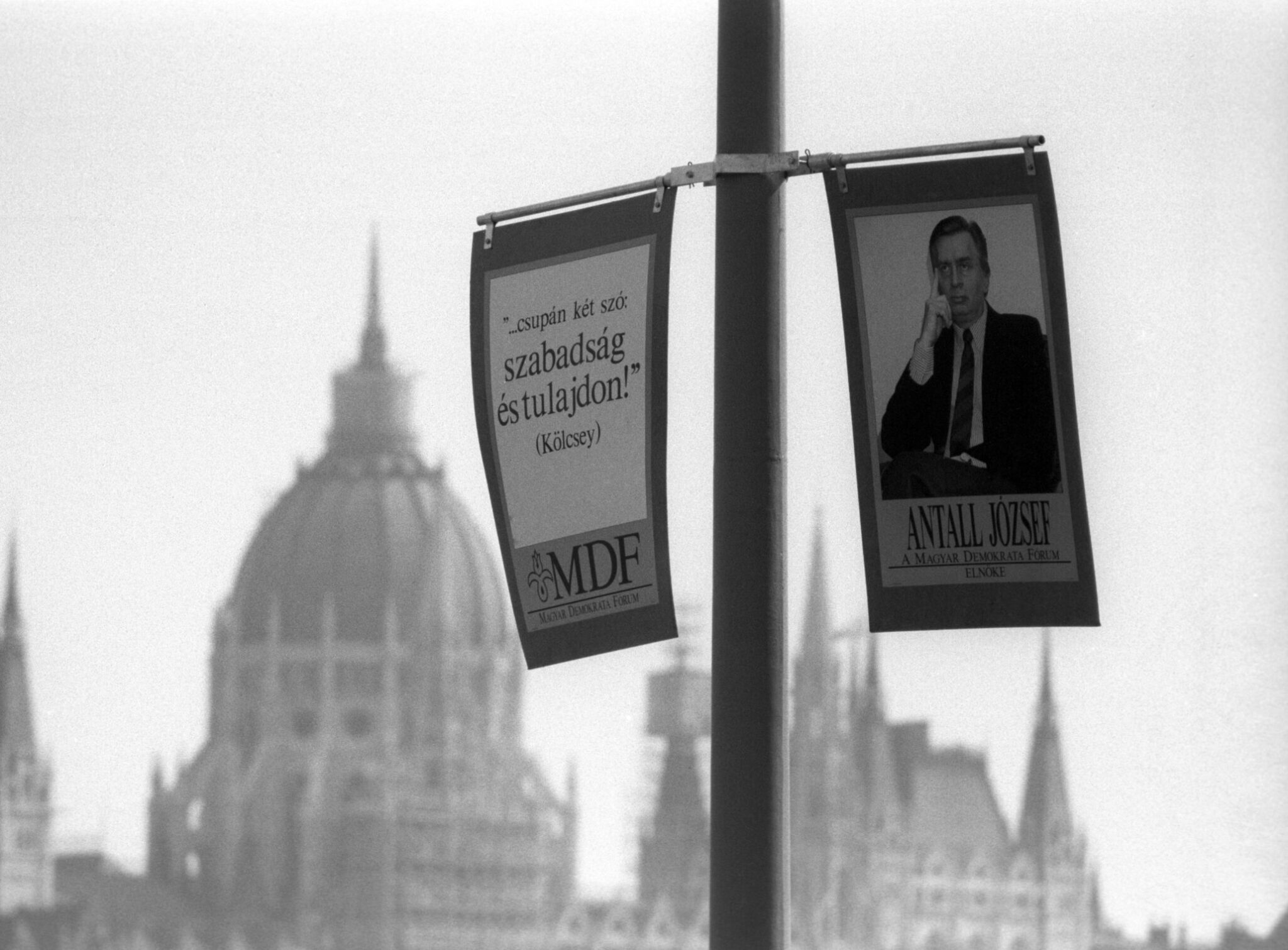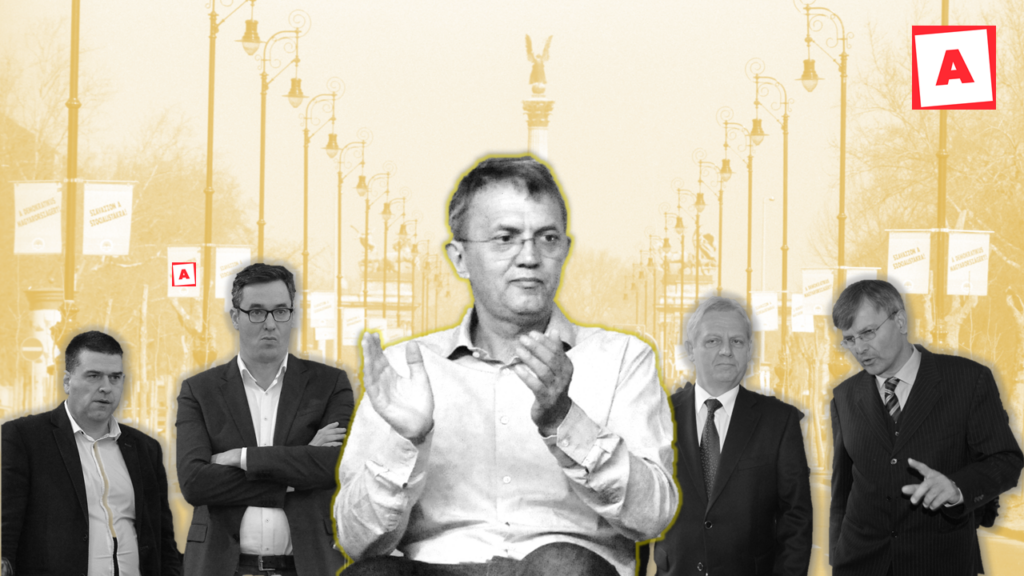The https://english.atlatszo.hu use cookies to track and profile customers such as action tags and pixel tracking on our website to assist our marketing. On our website we use technical, analytical, marketing and preference cookies. These are necessary for our site to work properly and to give us inforamation about how our site is used. See Cookies Policy
The sole bidder grabbed the capital’s lamppost advertising spaces in a questionable tender
István Garancsi has reason to celebrate. His media company ESMA Reklám Zrt, along with László Tasnádi’s Sys IT Network Zrt, won the tenders for the use of the capital’s lampposts. The Municipal Assembly did not vote for it, but Budapest Mayor Gergely Karácsony, acting on his own authority, declared the tenders valid. The City of Budapest circumvented the obligation for concession – a red flag. The predecessor of Sys IT Network was also an important player in one of the biggest account creation fraud scandals of recent years – red flag number two. One of ESMA’s competitors, Hungaroplakát Kft also wanted to compete in the tender, but they have claimed that the wording in the eligibility criteria shut them out – big, big red flag.
Public spaces in Budapest are valuable advertising spaces. Bus stops, underpases, lamp posts – tens of thousands of people see these, subconsciously remember them when they’re good, consciously file them away when they’re terrible.

But these advertising spaces are not directly managed by the City of Budapest. Mainly under the Demszky administration, their use was outsourced to various media companies, which pay rent to the City of Budapest and bill advertisers for the displays.
The 44,000 lamp posts in Budapest are owned by the City of Budapest, BKK and the Budapest Decorative and Street Lighting Ltd (BDK). The previous five-year contract, signed in 2018 between then-Mayor István Tarlós with ESMA Reklám Zrt, was set to expire in April, so the City of Budapest put out a call for tenders for their rental.
ESMA, which dominates the Hungarian public advertising market, is owned by Fidesz-leaning oligarch István Garancsi. Previously, it was owned by left-leaning István Bleuer, until 2015. According to the lease signed by Tarlós, ESMA has been paying a HUF 250 plus VAT per lamp post per day to the city.

Budapest, 20 March 1990. Election poster of the Hungarian Democratic Forum on the bank of the Danube in Buda. MTI Photo by Gyula Bartos
Data from the Municipality of Budapest shows that ESMA has, in reality, only used around a thousand posts per month out of the 44,000 available ones for advertisements. ESMA paid a net total of HUF 91 million in 2021 and HUF 109 million in 2022 to the city to rent the poles.
Depending on the type of sign and the city area, ESMA offers its customers advertising space on the capital’s lampposts at a list price of HUF 35,000 to 140,000 plus VAT per month. This translates into HUF 1,100 to 4,600 plus VAT per day. According to one advertising expert, ESMA’s turnover from billboard advertising in Budapest is estimated to be around HUF 1.5 billion – half of their total turnover.
ESMA closed last year with a pre-tax profit of HUF 512 million (including profits from across the entire country).
The Municipal Assembly voted against, the Mayor of Budapest decided
In April this year, the City and the asset manager of the capital (Budapest Capital Asset Management Centre, BFVK) announced the tender for the next five-year period, which can be extended for another five years. The tender, published on the BKK, BKV and BDK websites respectively, was for two separate activities, which had to be tendered for separately: one call for tenders for the installation of advertising devices on lampposts and the other for the installation of traffic data measuring devices on street lighting poles. The call for tenders also set a minimum rental price of HUF 381 plus VAT per pole per day for both activities.
Both calls received only one bid each. Former tenant ESMA submitted a bid for the lease of advertising space and Sys IT Network Zrt for the installation of traffic data devices, both at the minimum rent specified in the call for tenders. In its submission, the Department of Property Management of the Municipality of Budapest recommended to the General Assembly to accept the tender as valid.
However, the Municipal Assembly, held on May 24, did not unanimously support the proposal. In her speech before the vote, Krisztina Baranyi, mayor of Ferencváros, asked for the tender to be declared inconclusive because, in her opinion,
“it was unrealistic that there was only one applicant.’
She also criticized the checkered past and ownership history of the companies, especially Sys IT Network. She wasn’t wrong. Sys IT Services, the company’s predecessor, rose to fame in 2021 for possibly the biggest fake invoice fraud of the last decade. According to the tax authority, the suspects caused a total of HUF 4 billion in damages to the budget.
Karácsony noted at the assembly: “If the assembly rejects the proposal, it will result in the invalidity of the tender as a pro forma measure.” Famous last words.
The assembly did not support the proposal – Krisztina Baranyi and six DK MPs voted against, Sándor Szaniszló, the DK mayor of the XVIII district abstained and three MPs did not vote – but Gergely Karácsony decided in July on his own authority to approve the validity of the tender.
The reason? The City of Budapest explained that, in the event of invalidity, the previous contract with ESMA would remain in force for an indefinite period at lower prices due to a May 31 government decision.
However, no similar external constraints were found in the case of the other tender with Sys IT Network – the tender most contested by Baranyi – nor was there an explanation for why the City didn’t raise the issue at the June assembly.
A suspicious call for tender with no competition
The first issue: the leasehold form, which was already in use under Tarlós. According to a public procurement legal expert we interviewed, the capital probably dragged this legal construction in to avoid having to carry out a concession procedure.
The concession procedure is a quasi-public procurement procedure, so it is subject to the rules familiar from public procurement, such as the publication of the notice and the fact that no money can be asked for the documentation. Similarly, the Public Procurement Authority will check whether the conditions restrict competition. Finally, the result can be challenged if the tenderer violates the law.
By contrast, the City has issued a plain tender.
2012 saw a similar case, when BKV issued a tender for the use of advertising spaces on the premises of its property and on the exterior and interior surfaces of public transport vehicles, and for the provision of advertising activities related to these spaces.
At that time, one of the actors turned to the Public Procurement Arbitration Committee (KDB) because, in its view, the procurement of BKV concerned the provision of services covered by the Public Procurement Act in the form of a service concession. The company claimed that BKV had deliberately misdescribed the contract as a lease contract. BKV, on the other hand, claimed that it would not have used any services from the winning bidder, but would have simply leased the right to use its surfaces for advertising purposes. The KDB, however, condemned BKV and considered the tender to be in violation of the Public Procurement Act.
According to our legal expert, both activities in the 2023 call for tenders issued by the City included additional services that go well beyond simple leasing. The Municipality of Budapest ordered the provision of a service – in the expert’s view, therefore, the call should have been a service concession and a concession procedure.
It is clear from the submission to the General Assembly that the tender dossier was purchased by three parties – in addition to the known winners, Hungaroplakát Kft. was the third interested party.
The price of the Budapest light pole tender documentation was 100,000 HUF plus VAT. It was assumed that if Hungaroplakat had paid this amount, they were serious in their intentions to start. We therefore contacted the managing director, Zoltán Páva, and asked why, after purchasing the documentation, they did not submit an application in the end. The CEO’s reply is reproduced verbatim here at his request:
“Hungaroplakát Ltd. examined the details of the tender and concluded that the technical conditions required by the tenderer were formulated in a way that did not meet the capacity of our company. As can be seen from the tenders submitted, no other potential tenderer, apart from the one submitted, could be considered to have fulfilled all the conditions required by the tenderer.”
It is difficult to understand the above lines in any other way than that, according to Páva, the tender was deliberately issued with restrictive conditions that only ESMA could meet. Incidentally, after the unsuccessful May assembly in the capital, an opposition politician told Index that “the problem with this tender is that all other market participants have been squeezed out in favour of the government-backed operator.”
Hungaroplakát has an annual turnover of HUF 1 to 1.5 billion, but its pre-tax profit was only HUF 15 million last year. Hungaroplakát played a significant role in the 2022 opposition campaign, because it provided advertising space for opposition parties who allegedly had little or no chance to buy advertising space elsewhere.
According to our information, the problem was the fulfilment of the requirements listed in point 8.6 of the eligibility criteria:
- One must provide proof of having carried out advertising activities on at least 100 signposting devices on street lighting and/or electricity poles in a power supply environment in the period 2018 to 2022.
- One must have a contract with the electricity distribution network licensee for the installation, operation and control of an orientation or signage advertising device on a street lighting or light pole in the electricity distribution network for at least 180 consecutive days for the period 2018 and 2022.
The criterion in the first sub-clause was also included in the 2017 Tarlós call for tenders, but with a higher number of poles (1,000). In this respect, the call was more lenient than before.
The second restrictive subsection, on the other hand, is new. We asked the Municipality of Budapest why it was necessary to include a specific reference in the second subsection, but the answer we received was lacking in a coherent explanation.
We asked István Bleuer, the former owner of ESMA, whether he thinks there is any operator in Hungary other than ESMA that could have met both eligibility criteria.
He responded: “The City of Budapest certainly tendered for the job in a conscious and tailor-made way, but I am convinced that there is no other company today that is prepared and able to do the job. There is no one else with the experience, the equipment, or the electricity licenses. The Office would have lost time and significant revenue if it had had to accept applications that were potentially unsuitable for the job. At most, it would not have been subject to political attacks.”
Why outsource advertising space at all?
According to advertising market experts, there would be no need for the capital to outsource the management of advertising on the pillars, which could be done by a municipal company if it was set up adequately.
In the past, the BKV company Peron Reklám Kft carried out similar activities. The organization and marketing of the capital’s festivals and fairs is also managed by a separate Budapest company, Budapest Brand nZrt.
This would bring many advantages. For one, it would make a contract with a Garancsi company moot. The City would also be freer to use its own advertising space.
The ESMA contract includes two clauses: (1) the advertisements may not contain any information that “serves to promote or encourage support for a party, political movement or government, or promotes their name, aims, activities, slogans or emblems”, and (2) it is prohibited to post anything that “seeks to influence the recipient in order to achieve an aim of public interest.”
Obviously, the City of Budapest has tried to eliminate the danger of displaying government propaganda. It has also tied itself to these restrictions, since it now cannot disseminate its own public messages on these surfaces.
We asked the City of Budapest whether they had considered managing the platforms on their own instead of outsourcing them.
The capital responded: “The strict asset utilization and procurement rules for the operation of public companies make it illusory for the Municipality of Budapest to use these spaces with the flexibility required by the advertising market. The specificities of the advertising market (brutal volume discounts) also require a volume of space for utilization in an independent company that the Municipality of Budapest does not have.”
Not everyone agrees. We spoke to several experts in the advertising market who believe that there is a strong case for the municipality to manage its own space. We also asked István Bleuer whether it would be possible to set up a suitable city organization over the course of a few years. He said that it wouldn’t even take years, but he acknowledged: “in the capital they are clumsy.”
In another opinion, the capital should take control of their electricity poles – along with all other advertising space. This, however, is hampered by the ongoing long-term contracts signed under Demszky back in 2006.
Translated by Vanda Mayer. The original, more detailed Hungarian version of this story was written by Orsolya Fülöp and can be found here.
Share:
Your support matters. Your donation helps us to uncover the truth.
- PayPal
- Bank transfer
- Patreon
- Benevity
Support our work with a PayPal donation to the Átlátszónet Foundation! Thank you.
Support our work by bank transfer to the account of the Átlátszónet Foundation. Please add in the comments: “Donation”
Beneficiary: Átlátszónet Alapítvány, bank name and address: Raiffeisen Bank, H-1054 Budapest, Akadémia utca 6.
EUR: IBAN HU36 1201 1265 0142 5189 0040 0002
USD: IBAN HU36 1201 1265 0142 5189 0050 0009
HUF: IBAN HU78 1201 1265 0142 5189 0030 0005
SWIFT: UBRTHUHB
Be a follower on Patreon
Support us on Benevity!

